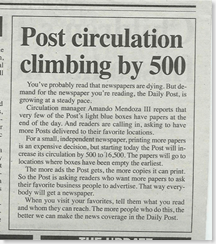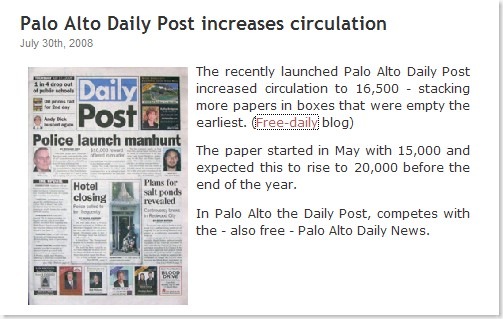Wednesday, July 30, 2008
Newspaper meltdown 4: Rise of the free dailies--a paradigm with promise?
by Larry Geller
There is always hope . Could this be it?
This clipping is snatched from the blog free-daily.com. Stay tuned through that blog ("Covering the emerging free daily newspaper industry") and other sources of information on this growing counter-trend to the meltdown of traditional paid-circulation papers.
Residents of Palo Alto, California, can't get enough of the free daily newspapers available in their town. The first free daily was the Daily News, which started in 1995 after the collapse of the town's paid circulation daily. The founders of the Daily News, after selling to Knight Ridder four years ago, returned in late May to start the Daily Post. So Palo Alto — the home of Stanford University and many high-tech firms like Hewlett Packard — is seeing a rebound in printed newspapers. It's what the techies might call "Old Media." And, as the Post reports in its July 22 issue, demand for the printed word is soaring. [Readers love free daily newspapers, freedaily.com, 7/24/2008]
But it's free, you say, how can they make money (an old family joke: "They make it up in volume"). Ads, of course. Just like the paid papers. There must be something different, though, to make it work. Lots different. (I don't know how to account for all the free papers the Star-Bulletin gives away. Maybe they can be considered a partially-free daily(?). )
Another article on the Post from the blog Newspaper Innovation ("Daily blogging on free daily newspapers"):
Some statistics from the same source:
- In less than 10 years free daily newspapers have been introduced in almost every European country and in several markets in the United States, Canada, South America, Australia and Asia. As of December 2007, there were free newspapers in 52 countries.
- Market leader Metro distributes more than eight million copies daily, while other companies publish more than 32 million. These copies are read by at least 70 million people daily.
- In four European countries (Iceland, Denmark, Spain and Portugal) more free than paid papers are distributed from Monday to Friday, while in more than a dozen European countries, the newspaper with the highest circulation is a free paper.

Why can "free" save the news biz? Maybe because it's in sync with the times. While older generations expect to pay for quality, younger folks are used to getting things free. More than just strangely-named Internet services. Everything. Really. Read more about this in the Wired article: Free! Why $0.00 Is the Future of Business.
I think this bears watching, anyway.
The fee for a newspaper was never a profit generator. It was always what they call a “nuisance fee” designed to make people value the newspaper and so copies don’t wind up in the trash. Ad’s always paid for almost everything.
The newspaper industry disingenuously if not stupidly claims that they are losing money because people aren’t buying newspapers and going to the internet where it’s free. Then they fire and eliminate the positions of those creating the content people want.
But if free newspapers are driving out paid ones it’s apparent their whole current business plan is based on a lie they either believe or use to make more money without providing product.- that the reader used to pay and now it’s free on line.
What’s really happening is that people can no longer get real news in the paper because the industry has eliminated most of the staff that generate what people want to read about. That’s why people use the internet- to search for good writing and investigative pieces in 10 different sources because they can’t get it all in one good hard-copy newspaper any more..
So advertisers realize they aren’t getting value any more and don’t put any money into advertising because they’d have to advertise in 10 papers just to get the value they used to get from one or two. .
Personally that’s why, even though I’m a throwback who loves the touch and even smell of a hard copy, no longer subscribe to any- I’d have to get 10 of them and skip 99% of each to get the same news. And I’m not going to buy a rehashing of the AP wire on paper that I can get on-line without having editors selecting which articles I get to see.
The number of people reading on-line is still really minimal and the loss of readers of newspapers- they’re off, what, 10%?- are not just reading on line. They’re simply not news consumers because they were raised in this age when they don’t see any reason to but the newspaper because the content stinks.
There’s still a chance to “save” the paper newspaper but not if they keep blaming the readers and advertisers and don’t look at their own downgrading of newsgathering and reporting.
The transition is agonizing, but newspapers will be better off when they are less profitable and therefore are of less interest to the Wall Street animals.
Sam Zell is dismembering great institutions in Chicago, Los Angeles and Baltimore, and doesn't understand why anyone would care. It's just another business deal, right?
How do you get rid of a Sam Zell and all others like them? You live in poverty, making marginal profits, the way newspapers used to do. The last 40 years have been a bizarre wrong turn onto Wall Street, and newspapers are about the get back to their roots.
There will be a thousand innovations. Free newspapers, yes, and virtual publications that charge subscriptions, neighborhood web sites funded by a Daddy Warbucks sponsor with an axe to grind, the return of widely read daily political party publications -- more variations than you and I can imagine, almost all marginally profitable, if that.
Publicly traded newspaper companies may not make it, but "newspapers" will in some form. It will be a hard life for the professional editors and reporters living in post-Media Meltdown, though.
BTW, Andy, you haven't yet grasped the extent of the shakeout if you think AP can exist without newspapers. AP dies when they die.
http://newsosaur.blogspot.com/2008/08/who-will-feed-ap-news.html
Anonymous, I think you are right about the agony and about the thousand innovations.
Whether we will be better off, I don't know, though (but what do I know anyway). Up until recently the business model supported papers like the New York Times. Should the NYT shrivel down to a thin experiment, I'm not sure we really will be better off.
Regardless of what I think, though, your analysis sounds reasonable to me.
If journalists themselves drive some of the experiments, perhaps we will be better off.
I was speaking as a news consumer who isn’t going to buy a paper just to get AP content.
AP, locally at least and I suspect now internationally is just a regurgitation of original news from other publications. I don’t think I’ve seen more than a handful of enterprise reporting articles from AP in Hawai`i in the last year. But then if the trends continue the AP “reporters” will just have to dig a little deeper and go to those thousand sources- just like they did 50 years ago. What goes around comes around.
<< Home






Post a Comment
Requiring those Captcha codes at least temporarily, in the hopes that it quells the flood of comment spam I've been receiving.